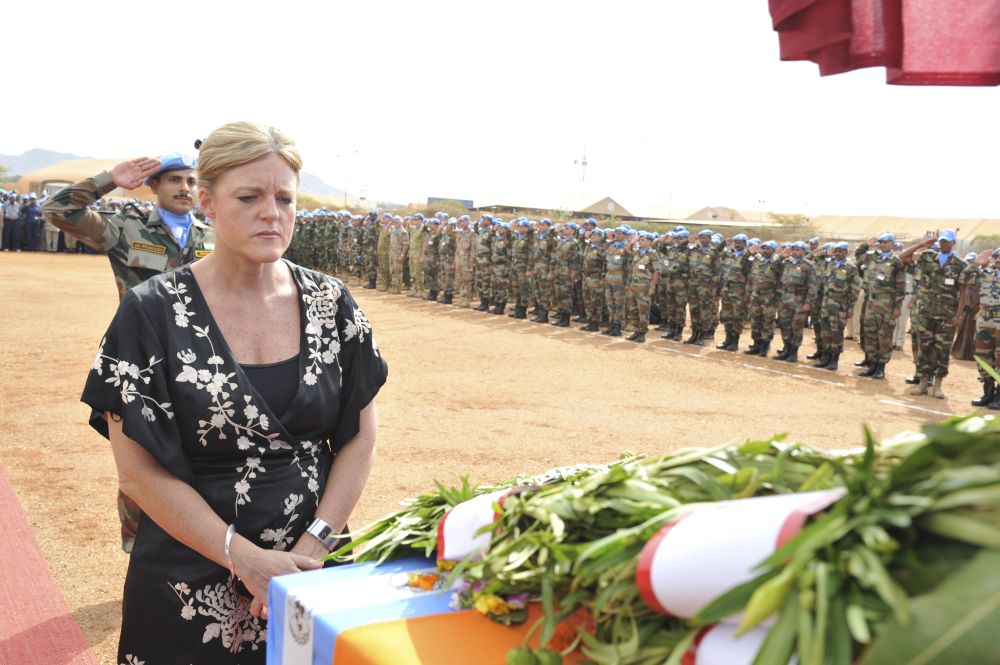The people of South Sudan have taught us a powerful lesson: never surrender to pessimism. Their resilience, which brought them an independent country, has also helped South Sudan overcome the daunting challenges of going through eighteen long months virtually without government revenues. I doubt that any other nation would have avoided a meltdown from that situation. The time has come to make decisive strides to consolidate peace and stability throughout the country, focus on state building and nation building, and deliver on the peace dividends that the South Sudanese people have waited for so long.
Following the inspiring example of the people that it serves, the United Nations Mission in South Sudan, UNMISS, has also remained resilient in the face of adversity. As we observe the International Day of the United Nations Peacekeepers on 29 May, we pay tribute to sixteen of our bravest colleagues who died in two senseless tragedies: the downing of an UNMISS helicopter on 21 December 2012 and an ambush on a UN convoy on 9 April. Among the dead were four Russian crew members, five Indian soldiers--who died while fighting to protect their colleagues--, and two South Sudanese civilians.

Hilde F. Johnson attends the memorial service for five Indian soldiers and one national civilian staff killed in an ambush on 9 April (Photos: UNMISS/Isaac Billy)
Both tragedies happened in Jonglei, a state most afflicted by insecurity and instability and which is the focus of the UNMISS mandate to protect civilians. Last year, UNMISS received threats by anti-government armed elements against one of our bases in Pibor County. Our response was to increase our military presence in the county.
UNMISS has conducted well over a thousand military patrols of long and short duration across Jonglei State since last August to reach out to and protect all communities. We have recently increased our military presence throughout the state to six companies, equally present in the areas of Jonglei's three main communities (Bor Dinka, Lou Nuer and Murle). We are not the peacekeepers of one community; we are the peacekeepers for all of them.
But even if we were to deploy up to our last pair of boots and all our assets to Jonglei or to any other state, we could never replace the Government, the police or the military in that part of the country. The primary responsibility to protect the population rests with the Government of the Republic of South Sudan. Like all UN Peacekeeping missions, UNMISS can only support the country's institutions to help them fulfill their responsibilities as a sovereign State. We put at their service the resources that UN member states so generously give us to achieve the goal that they and the Government of South Sudan have set for us: to help consolidate peace and security, to help extend and consolidate the authority of the Republic throughout the entire territory of South Sudan, and to help establish the conditions for development.
Together, the Government and the UN family in South Sudan are doing a great deal to achieve this goal. I will highlight three areas where significant progress is being made amidst daunting challenges.
Firstly, protection of civilians, which has been the driving force of UNMISS since it was established less than two years ago. UNMISS has consistently provided physical protection to civilians fleeing from violence. The gates of our base in Wau, the state capital of Western Bahr el Ghazal, were opened to over 5,000 civilians who sought refuge from clashes for several days in December last year. Similar scenes have occurred in Pibor and Gumuruk, Jonglei State, where groups of civilians numbering from a few hundred to as many as 3,000 have taken shelter in UNMISS bases on several occasions since the start of this year.
The second area where steady progress is taking place is the transformation of the South Sudan National Police Service (SSNPS) into a professional and effective police force. The Government and the SSNPS, with the support of UNMISS and other partners, have completed the registration of 46,000 police officers, and those "ghost" officers who exist on the payroll but perform no policing functions will be weeded out. At the same time, UN Police are training police at all levels to improve the conduct and capacity of the SSNPS and help transform the whole police service.
A third area where progress is moving forward is the rule of law. The Government, with the support of UNMISS and other UN partners, has addressed more than a thousand cases of prolonged and arbitrary detention. Mobile courts are also being established by the Government with our support to address prolonged and arbitrary detention, and to improve access to justice.
Much bigger strides are needed in the coming months to consolidate the still fragile institutions of South Sudan. UNMISS will help the Government make headway in pursuing further political reforms, improve the human rights situation throughout the country, and conduct a population census and democratic elections.
There is no single recipe to achieve these milestones. But there are two ingredients that must be present in any of them: transparency and accountability - of the Government, the public administration, the police, the SPLA, the communities, grass-root organizations, the oil companies, the media and, of course, the international organizations and the UN Mission in South Sudan. Personal accountability and responsibility should guide all of us- the Government and all its institutions, and international partners- to prove the nay-sayers wrong and help South Sudan fulfill its promise of a better life for all.
Hilde F. Johnson is the Special Representative of the United Nations Secretary-General in South Sudan and Head of UNMISS.
Find out more at www.unmiss.unmissions.org and www.un.org/peacekeeping
